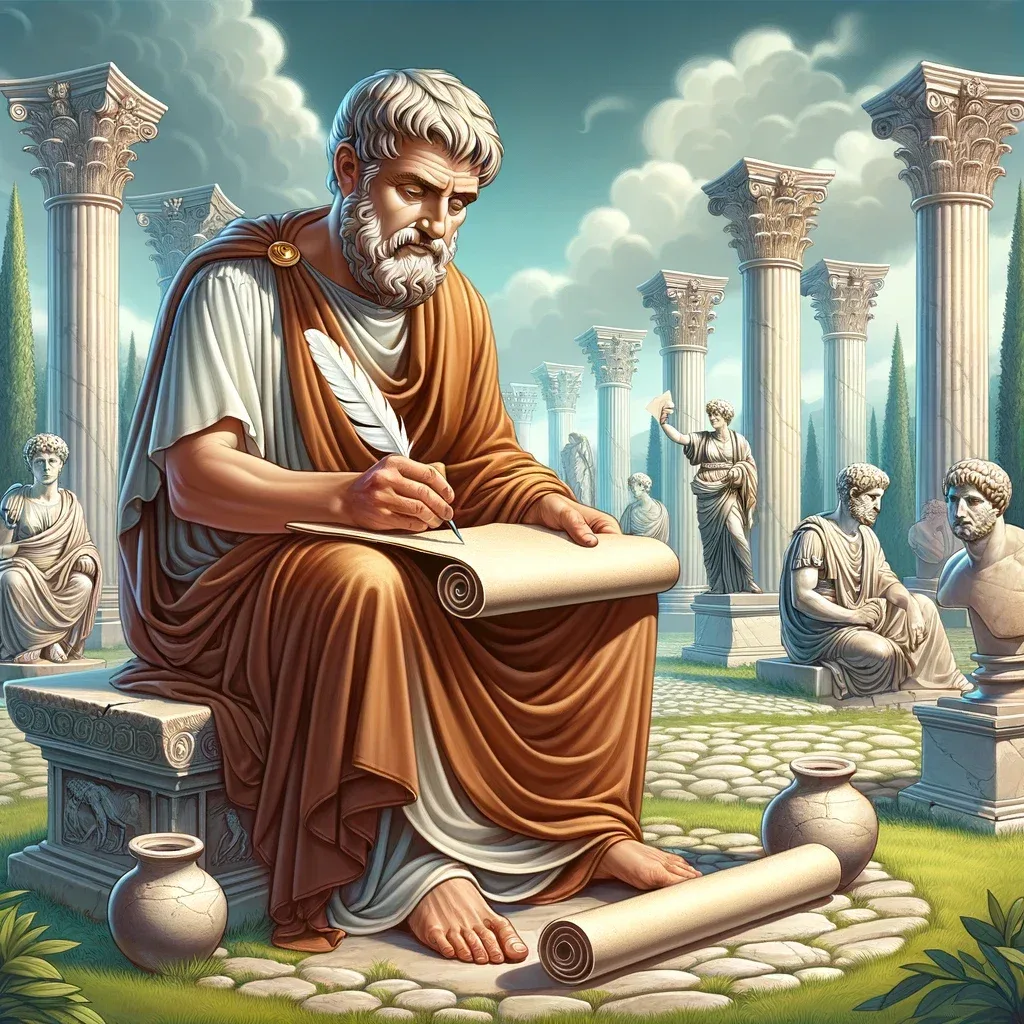The search for wisdom is a path that many philosophers throughout history have followed. Lucius Annaeus Seneca, a Roman Stoic philosopher, stood out as a guide for those who seek wisdom as a way to live a virtuous and meaningful life. His Stoic ideas provide a framework for understanding and dealing with the vicissitudes of life, allowing for more intentional and purposeful living.

The Concept of Wisdom in Seneca
Definition of Wisdom
Seneca defines wisdom as a clear and deep understanding of things, including their nature, their causes, and their implications. He argues that true wisdom comes from understanding our own limitations and controlling our emotions and desires. For Seneca, wisdom is not just an accumulation of knowledge, but a way of living that is in harmony with nature.
Wisdom and Virtue
For Seneca, wisdom is intrinsically linked to virtue. He believes that a sage is someone who lives virtuously, which means living in accordance with reason and nature. Virtue, for Seneca, is the ultimate expression of humanity and the key to a full and meaningful life.
The Practice of Wisdom
Reflection and Self-Examination
Seneca emphasizes the importance of reflection and self-examination in the search for wisdom. It encourages the individual to reflect on their actions, decisions and emotions daily, as a means of achieving a greater understanding of themselves and the world around them. This practice of reflection allows for a more deliberate and intentional life.
Continuous Learning
In addition to reflection, Seneca sees continuous learning as crucial to the pursuit of wisdom. He believes that we should always be ready to learn, whether from our experiences, from others or from the wise men of the past. Continuous learning not only expands our understanding but also helps us live more virtuously.
Emotional Control and Acceptance

The Importance of Emotional Control
For Seneca, emotional control is a crucial component in the search for wisdom. He argues that emotions, when left unchecked, can cloud our judgment and divert us from the path of virtue. Through emotional control, we can respond to life situations calmly and reasonably, rather than being governed by emotional impulses.
Acceptance of the Nature of Things
Seneca believes that acceptance of the nature of things is fundamental to wisdom. Accepting what is out of our control and focusing on what we can control is a way to live in harmony with nature and achieve a form of practical wisdom.
Seneca and Wisdom in Everyday Life

Practical Application
Seneca's Stoic principles offer a way to apply the pursuit of wisdom to everyday life. Through reflection, continuous learning, emotional control and acceptance, we can live more intentional and meaningful lives, facing life's challenges with serenity and discernment.
The Continued Relevance of Seneca's Wisdom
Seneca's ideas about wisdom continue to resonate with many to this day. His Stoic principles provide a valuable guide for those seeking to live more virtuous and intentional lives, showing that the pursuit of wisdom is a journey worth undertaking.
Wisdom, as explored by Seneca, is not a destination, but an ongoing journey of self-improvement, reflection, and understanding. His teachings provide a path to living a fuller life, facing adversity with resilience and finding joy and meaning in life's experiences. His legacy is a testament to the enduring power of Stoic wisdom and its continued relevance in the pursuit of a life well lived.
FAQ: Seneca and the Search for Wisdom

1. How does Seneca define wisdom?
Seneca views wisdom as a clear and deep understanding of things, which includes understanding their nature, causes, and implications. He also associates wisdom with control over emotions and desires, and with understanding human limitations.
2. What is the relationship between wisdom and virtue according to Seneca?
For Seneca, wisdom and virtue are intrinsically linked. Virtue is seen as an expression of humanity and the key to a full and meaningful life, while wisdom is the path that allows one to live virtuously.
3. How does Seneca suggest that people practice wisdom in everyday life?
Seneca emphasizes reflection and self-examination, encouraging individuals to reflect on their actions, decisions, and emotions. Furthermore, he values continuous learning and acceptance of the nature of things as integral parts of the practice of wisdom.
4. Why is emotional control important in the search for wisdom?
Emotional control is seen by Seneca as crucial because uncontrolled emotions can cloud judgment and lead people astray from the path of virtue. With emotional control, it is possible to respond to life situations calmly and reasonably.
5. What does Seneca mean by “acceptance of the nature of things”?
Seneca refers to accepting what is beyond our control and focusing on what we can control. This allows you to live in harmony with nature and achieve a form of practical wisdom.
6. How can Seneca's Stoic principles be applied to modern life?
Seneca's Stoic principles can be applied to modern life through daily reflection, continuous learning, emotional control, and acceptance. These practices can help individuals live more intentional and meaningful lives.
7. What are Seneca's recommendations for lifelong learning?
Seneca believes that people should always be ready to learn, whether from their own experiences, from others, or from the wise men of the past. Continuous learning is seen as a way to expand understanding and live more virtuously.
8. How do reflection and self-examination contribute to the search for wisdom?
Reflection and self-examination allow for a greater understanding of oneself and the world around oneself, helping individuals live more deliberately and intentionally. These practices promote introspection and understanding, which are crucial to the pursuit of wisdom.
9. What is the continued relevance of Seneca's wisdom in modern life?
Seneca's wisdom remains relevant because it offers a framework for living a virtuous and intentional life. His ideas about reflection, emotional control and acceptance are particularly useful for facing the challenges of modern life with serenity and discernment.
10. Does Seneca see wisdom as a destination or a journey?
Seneca views wisdom as an ongoing journey of self-improvement, reflection, and understanding. He believes that the search for wisdom is an ongoing process that allows you to live a fuller and more meaningful life.






